| |
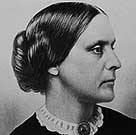 |
Susan
B. Anthony and her three sisters entered a voter registration
office set up in a barbershop. They
were part of a group of fifty women Anthony had organized to
register in her home town of Rochester. Anthony walked
directly to the election inspectors and, as one of the inspectors
would later testify, "demanded that we register them as
voters." |
| The
election inspectors refused, but she persisted, quoting
the Fourteenth Amendment's citizenship provision and the
article from the New York Constitution pertaining to voting,
which contained no sex qualification. She persisted: "If
you refuse us our rights as citizens, I will bring charges
against you in Criminal Court and I will sue each of you
personally for large, exemplary damages!" |
| The inspectors sought the advice of the Supervisor of elections: "Young
men," he said, "do you know the penalty of law if
you refuse to register these names?" Registering the women,
the registrars were advised, "would put the entire onus
of the affair on them." The inspectors voted to allow
Anthony and her three sisters to register. |
| In
all, fourteen Rochester women successfully registered that
day. But the Rochester Union
and Advertiser editorialized: "Citizenship no more carries
the right to vote that it carries the power to fly to the moon
. . . if these women in the Eighth Ward offer to vote, they
should be challenged, and if they take the oaths and the Inspectors
receive and deposit their ballots, they should all be prosecuted
to the full extent of the law." |
 |
|
| Australia abolished peace-time compulsory
military training. |
|
A
war of independence to end French colonial rule over
the north African nation of Algeria began when 60 bombs
were set off on this day in Algiers, the capital. Over
the next eight years 1.5 million Algerians would die,
along with about 30,000 French. The French had dominated
the country since 1830.
|

|
| French
troops clash with Algerian civilians |
“The
Battle of Algiers,” a movie about the Algerian struggle
for independence  |
Read
more  |
|
The U.S.
produced the biggest ever man-made explosion in the Pacific
archipelago of Bikini, part of the Marshall Islands. The hydrogen
bomb, equivalent of 20 million tons of TNT was up to 1,000
times more powerful than the atomic bomb that destroyed Hiroshima.
It overwhelmed the measuring instruments, indicating that the
bomb was much more powerful than scientists had anticipated.
One of the atolls was totally vaporized, disappearing into
a gigantic mushroom cloud that spread at least 100 miles wide,
dropping back to the sea in the form of radioactive fallout. |
|
 |
50,000-100,000
women joined protests against the resumption of atmospheric
nuclear tests by both the U.S.
and the Soviet Union. The demonstrations, in at least 60
U.S. cities, led to the founding of Women Strike for Peace.
Their slogan: “End the Arms Race – Not the Human
Race.”
|
See Photos from Swarthmore College Peace Collection  |
 |
<“Women's
Strike for Peace" storming the Pentagon in a 1967
protest against the war in Vietnam.
|
 |
Bella
Abzug demonstrating with WSP>
photo: Dorothy Marder
|
|
| Detroit’s
Common Council voted for immediate withdrawal of U.S. armed
forces from Vietnam. |
|
A
senior State Department official, Jonathan T. Howe, told Secretary
of State George P. Shultz about intelligence
reports that showed Iraqi troops resorting to "almost
daily use of CW [chemical weapons]" against the Iranians.
Saddam Hussein had invaded Iran in 1980.
But the Reagan administration had already committed itself
to a large-scale diplomatic and political overture to Baghdad,
culminating in several visits by the president's recently appointed
special envoy to the Middle East, Donald H. Rumsfeld. |
|
| As part
of the adoption of the International Law of the Sea, forty-three
nations agreed to ban dumping industrial wastes at sea by
1995. Neither the U.S. nor Canada (along with Albania, Burundi,
Ethiopia, Uzbekistan and San Marino) have ever ratified the
treaty which thus lacks the force of U.S. federal law. |
More
on the Law of the Sea  |
|
| The Tel Aviv memorial for
Israeli leader Yitzhak Rabin, slain eight years previously,
was transformed into a peace rally with over 100,000 protesting
the military policies of Prime Minister Ariel Sharon. |
|
"Yitzhak
was right, and his path just," said Shimon Peres,
the former prime minister and architect of the Oslo peace
accords with Mr Rabin. "His views today are clear
and enduring. There will be no retreat; we will continue." |

|
Read
more  |
|
 |
Socialist Party candidate Eugene
V. Debs received nearly one million votes for President though
he was serving a prison sentence at the time for his criticism
of World War I and his encouraging resistance to the draft. |
 < More on Debs > < More on Debs > 
|
|
| Voters
in nine general elections passed statewide referenda supporting
a freeze on testing of nuclear weapons. Only Arizona turned
it down. |
 |
Dr. Randall Forsberg,
a key person behind the Freeze movement
 |
| Dr.
Randall Forsberg |
|

|
A
bill designating a federal holiday honoring Dr. Martin
Luther King, Jr. (to be observed on the third Monday
of January) was signed by President Ronald Reagan.
King was born in Atlanta in 1929, the son of a Baptist minister.
He received a doctorate degree in theology and in 1955 organized
the first major protest of the civil rights movement: the successful
Montgomery Bus Boycott. Influenced by Mohandas Gandhi, he advocated
nonviolent civil disobedience of the laws that enforced racial
segregation.
|
The
history of Martin Luther King Day  (pdf) (pdf) |
|
The
U.S. Supreme Court, in its decision Ex Parte Crow
Dog,
declared Native
Americans were ultimately subject to U.S. law, “not
in the sense of citizens, but . . . as wards subject to
a guardian . . . as a dependent community who were in a
state of pupilage.”
However, the Court acknowledged the sovereignty of tribal
authority in the particular case at hand. The Congress,
however, essentially
overturned the Court’s decision two years later. |
 |
| Chief
Crow Dog, 1898 |
More
on Ex Parte Crow Dog  |
|
| Bolsheviks, the followers of Vladimir Lenin, took
control of the capital, Moscow, and the Kremlin, the fortress-like
grouping of government buildings and churches at the center
of the capital city, as the Russian revolution succeeded. |
|
|
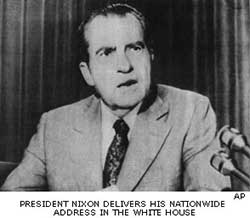
|
President
Nixon announced the "Vietnamization" program
to shift fighting by U.S. troops to U.S.-trained Vietnamese
troops. “We have adopted a plan which we have worked
out in cooperation with the South Vietnamese for the complete
withdrawal of all U.S. combat ground forces, and their replacement
by South Vietnamese forces on an orderly scheduled timetable.”
The
last U.S. troops didn’t return home
until 1975.
|
|
|

|
Five
hundred protesters from the "Trail of Broken Treaties," a
Native American march, occupied the Bureau of Indian
Affairs offices (part of the Department of Interior)
in Washington, D.C., for six days. Their goal was to
gain support from the general public for a policy of
self-determination for American Indians. |
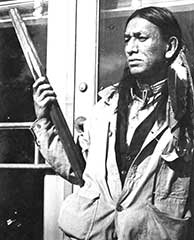 |
Read more about the occupation:  |
Read the Indian
Manifesto:  |
|
|
Five
members of the Workers Viewpoint Organization (later
the Communist Workers Party)
which had organized a "Death to the Klan" rally,
were murdered and ten others injured when the rally was
attacked by 40 Ku Klux Klan members and Nazis in Greensboro,
North Carolina. The political organization had been joined
in the march by a group of local African-American mill
workers. At the time of the shootings, not one police
officer was present.
Two all-white juries acquitted the murderers despite the
fact that the whole incident was on videotape. But in 1985
a federal jury found two policemen, a police informant/Klan
leader, and five Klansmen and Nazis liable for the wrongful
death of one of the demonstrators.
|
|
|

The
Rainbow Warrior bombed
|
Two
French agents of the DGSE (Secret Service) dramatically
changed their pleas on charges related to the bombing and
sinking of the Greenpeace’s ship, Rainbow Warrior,
and pled guilty. The ship was attacked in Auckland (New
Zealand) harbor in anticipation of sailing to Moruroa Atoll
to interfere with French nuclear weapons testing. It was
the first act of terror ever committed in New Zealand. |
Read
more  |
|
| A group of men in Bulwell, near Nottingham, England, armed
with hammers, axes and pistols in the dark of night, broke
into the workshop of a master weaver named Hollingsworth and
smashed six weaving machines the men thought threatened their
jobs. They and their supporters opposed the industrialization
that had turned home-based sustainable textile work into factory
work with significant loss of jobs through mechanization (and
those at much lower wages), as well as the attendant air and
water pollution. |
 Luddites smashing loom. Luddites smashing loom. |
They
called themselves followers of the probably fictional General
Ludd and continued their attacks for months, with over
a thousand knitting machines destroyed. In response, thousands
of troops were sent to stop the rebellion, and Parliament
passed a law making destruction of weaving machines a hanging
offense.
Luddites has since become a term used for those who oppose technology. |
|
|
Two
hundred thousand Russian troops with 1000 tanks stopped
an
anti-Stalinist uprising in Hungary and installed
a new pro-Soviet government. Although civilians had
set up barricades along all the major roads leading
to Budapest, the Soviet air force bombed the capital
and troops poured into the city in a massive dawn offensive.
Hungarian Army and National Guard troops participated in
the resistance; only Communist Party functionaries and
security police fought alongside the Warsaw Pact troops.
The help promised from the U.S. to protect and aid the
anti-Stalinists never came.
20,000 Hungarians ultimately died as a result (as well
as 4000 troops), and ten times that many left the country
permanently.
|

Hungarian
'freedom fighters' temporarily forced
back
Soviet tanks and troops. |

Soviet
tanks in Budapest. |
Pictorial
history of the Hungarian Uprising 
|
|
The first free elections in Nicaraguan history were held.
Nicaragua's ruling Sandinista Front claimed a decisive
victory (70%), defeating six other parties, in the
country's first elections since the revolution the
Sandanistas had led five years previous. The high-turnout
election (83%) was monitored by 400 independent election
observers who said the election had been fair. |
 |
Read
more  |
|
Israeli
Prime Minister Yitzhak Rabin was fatally shot minutes after
speaking at a peace rally held in
Tel Aviv's Kings Square
in Israel.
|
 |
 |
Yitzhak Rabin
|
 < Read
more > < Read
more >  |
| The
rally in Kings of Israel Square |
|
| The
first African American ever nominated by a major political
party as candidate for president went before
the electorate. Senator Barack Obama of Illinois and his Democratic
vice-presidential running mate, Senator Joseph Biden of Delaware,
faced Republican Senator John McCain of Arizona and Alaska Governor
Sarah Palin; independent candidates Ralph Nader and Matt Gonzalez;
Green Party candidates former Representative Cynthia McKinney and Rosa
Clemente; and former Repepresentatives Bob Barr and Wayne Allyn Root. |
|
| Susan
B. Anthony and a few other women in Rochester, New York,
voted in the presidential election, all of them for the
first time. |

|
She
wrote later that day to her fellow suffragist Elizabeth
Cady Stanton, “If only now—all the
women would work to this end of enforcing
the existing constitution—supremacy of national law
over state law—what strides we might make . . . .”
Anthony's vote went to U. S. Grant and other Republicans,
based on that party's promise to consider the legitimacy
of women’s
suffrage. |
 |
| Susan
B. Anthony |
Elizabeth
Cady Stanton |
Read Susan B. Anthony's speech On Women's Right to Vote  |
|
| The
Peace Pledge Union in Great Britain set up the Non-Violence
Commission to study
nonviolent resistance and how the ideas of Gandhi could be
used to reach the Union’s goals of getting U.S. troops
out of Britain and to end production of nuclear weapons there. |
|
 |
Bobby Seale, a founder
of the Black Panther Party, was sentenced to four years
in prison on sixteen counts of contempt of court during
the federal Chicago Eight trial in Chicago; he was charged
for his insistent claims to the right to choose his own
lawyer, or to represent himself. After the Chicago Eight
verdict, the contempt charges were withdrawn.
|
| Bobby
Seale |
BobbySeale.com  |
|
| 36
were arrested in a demonstration at Honeywell, Minnesota's
largest defense contractor. The "Honeywell Project," a
local campaign against the arms maker, dogged the company
for over three decades, at times with success. It
continues today, targeting Alliant Technologies, the
arms-making branch of Honeywell that was spun off in
the 1990s. |
 Protests
at Alliant continue today. Protests
at Alliant continue today.
|
Alliant is the manufacturer for the Pentagon of artillery shells
made with depleted uranium (DU or U-238, a by-product of uranium
enrichment) which have been used extensively in Iraq and Kosovo.
The Defense Department denies any health effects from use of
DU (though army manuals warn soldiers of its toxicity), and
contests accusations of DU’s role in Gulf War Syndrome.
|
More about the Honeywell project from War Resisters' international  |
|
Govan
Mbeki, an early leader of the African National Congress,
was released from South Africa’s Robben Island prison
after serving twenty-four years (for treason).
He
served his sentence alongside Nelson Mandela, Walter Sisulu and
many others who fought apartheid. |
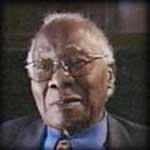
Govan
Mbeki
|
His
son, Thabo Mbeki, was elected in 1998 (and force to resign
in 2008) to succeed Mandela, who was the first president elected
following a new constitution which granted the right to vote
to the entire non-white population, comprising 85% of the country’s
population. |
 |
Read
more about Govan Mbeki  |
|
Mohandas
K. Gandhi led 2500 ethnic Indian miners, women and others
from South Africa’s Natal province across its border
with Transvaal in the Great March. This was a violation
of the pass laws restricting the movement of all non-whites
in the country.
Originally granted the rights of British subjects, Indians’ rights
were steadily eroded beginning in the 1890s with the
denial of the right to own property.
Shortly
before the March, a court in Capetown had invalidated all
Muslim and Hindu marriages. Gandhi and many others were arrested and jailed after refusing
to pay a fine. |

The
Great March to Transvaal |
|

Mohandas
Gandhi, 1915 |
Read
about the early resistance in South Africa  |
|
The
17th session of the U.N. General Assembly passed Resolution
1761 condemning apartheid in South Africa and called on
all member states to terminate diplomatic, economic and
military relations with the country. The policies of the country embodied in apartheid, the strict racially separatist regime, were declared a threat to international peace and security. |
 |
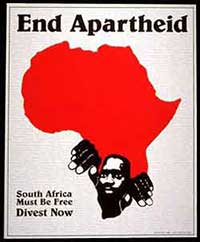
|
Apartheid
was the racially separatist regime under which black
and, to a somewhat lesser extent, so-called colored South
Africans, were without political, civil or economic rights.
All political power and wealth were held by the white
population, approximately 15% of the country. "Apartheid" is
the Afrikaans word for "apartness." (Afrikaans
is the language of the Boers, or [white] Afrikaners.)
|
U.N
pressure over the years on South Africa  |
|
2,500
people gathered in New York City’s Union Square to
witness the burning of draft cards, a violation of recently
passed federal law, as an expression
of resistance to the Vietnam War.
Dorothy Day, founder of the
Catholic Worker movement, and pacifist leader A.J. Muste spoke,
identifying with the "crime" about to be committed.
|
 |
Gordon Christianson, chairman of the Committee for Nonviolent
Action and a World War II combat veteran, used his lighter
to burn the cards.
A
counter-demonstrator shot a fire extinguisher at those
ready to burn their cards, but they still ignited.
And the counter-demonstrators shouted, "Burn yourselves,
not your draft cards!"
At trial, those who were arrested conceded the prosecution's case, submitting
footage of the action shot by a supporter. They made a defense under the First
Amendment to the Constitution, arguing that the burning of draft cards in such
a context was an act of symbolic speech. The trial judge found them guilty and
sentenced them to six months in federal prison. |
|
| Although
an American plane with supplies for the Nicaraguan contra insurgents had been shot down the previous month, and a Lebanese
newspaper reported that the U.S. government had arranged
for the sale of weapons to Iran, President Ronald Ronald
Reagan denied involvement (“. . . a story that came
out of the Middle East, and that to us has no foundation
. . . .”) in what came to be known as the Iran-Contra
scandal. Both the ongoing aid to the contras and the weapons
sales to Iran were violations of U.S. law. |
 |
|
| Abolitionist, clergyman and editor
Elijah P. Lovejoy, 34, was murdered by a pro-slavery mob in
Alton, Illinois, as he defended his newly delivered printing
press. |
|

Elijah
P. Lovejoy
|
He
had lost two other presses to mob attacks, but refused
to surrender this one, which had been contributed by
the Ohio Anti-Slavery Society. For this he was shot five
times in the fatal attack. Lovejoy had moved 20 miles
to Alton from St. Louis where, after denouncing the lynching
and burning of a black man, a mob tore down his office. |

Warehouse
with Lovejoy's press set ablaze by mob |
"We
must stand by the Constitution and laws, or all is gone."
Elijah
Lovejoy, The Observer |
Read
more  |
|
| 1700 members of
the Dakota Sioux, mostly women, children and the eldersly,
were force-marched 150 miles (240 km) to a
concentration camp at Fort Snelling in Minnesota. The four-mile-long
(6.5 km) procession was subject to physical abuse by white
residents of towns along the way. Governor Alexander Ramsey had
committed himself to ridding the state of all the Dakota,
raising the bounty on an Indian scalp to $200. |
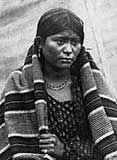 |
| One of the prisoners
at Fort Snelling |
Simultaneously,
300 Dakota men were tried summarily (as many as 40 cases
in a single day) and marched to another camp in Mankato.
They had surrendered to the U.S. Army at the end of the
Dakota War, expecting to treated as prisoners of war. |
|
| Jeannette
Rankin, a Republican from Missoula, Montana, became the
first woman elected to the U.S. Congress. American women
in 19 states had no voting rights whatsoever until passage
of the 19th amendment four years later. Female Montanans
had full voting rights even before statehood (in 1889). |
 |
| |
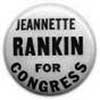 |
 Read more Read more  |
|
Hundreds,
presumed to be members of the Union of Russian Workers, were
arrested in New York and other cities across the country
on the second anniversary of the Russian Revolution. President
Woodrow Wilson’s attorney general, A. Mitchell Palmer,
and Intelligence Division chief, John Edgar Hoover, used
the Sedition and Espionage Acts to thwart what they saw as
a Communist plot to overthrow the government.
This was but one many assaults on radicals in what was known
as the Palmer Raids. Thousands were arrested and thousands
deported. It had been a year of significant labor unrest including
steel, coal, and Boston police strikes, and a Seattle general
strike. There was high unemployment in the wake of the demobilization
after World War I. Around May Day there had been dozens of
mail bombs, most of them intercepted, and a suicide bomber
died outside Palmer’s Washington residence. |
 The Palmer Raids The Palmer Raids  |
The first mass arrest of immigrant workers  |
Attorney
General Mitchell’s view  |
|
New Jersey became the first state
to allow girls to play
Little League Baseball. |
|
|
Thirty
thousand black and white, factory and dock workers staged
a general strike in New Orleans, demanding union recognition,
closed shops (where all co-workers join the union), and
hour and wage gains. They were joined by non-industrial
laborers, such as musicians, clothing workers, clerks,
utility workers, streetcar drivers, and printers.
|
|
United Mine Workers president
John L. Lewis and other labor leaders formed the Congress
of Industrial Organizations (CIO). They had split with
the existing labor union umbrella organization, the American
Federation of Labor (AFL), which was not interested in
organizing unskilled workers, such as those in the steel,
rubber, textile and auto industries. |
 John
L. Lewis John
L. Lewis |
CIO history  |
|
Nazis
looted and burned synagogues and Jewish-owned stores
and homes, and beat and murdered Jewish men, women, and
children across Germany and Austria. |
|

|
Known as Kristallnacht,
it was a night of organized violence against Jews marking
the beginning of the Holocaust with the killing of 91
and the deportation of 30,000 to concentration camps.
The German word translates to "the Night of Broken
Glass," so called because of the vast number of
broken windows in Jewish shops, 5 million marks worth
($1,250,000). |
Read
more  |
|
At
the first draft-card burning [see November 6, 1965],
a heckler shouted that they should burn themselves,
not
their draft cards. Three days later Roger LaPorte, a student
of religion and a Catholic Worker volunteer, poured gasoline
on himself and struck a match to it in front of the United
Nations headquarters in New York.Police managed to douse the flames.
|
 Roger LaPorte Roger LaPorte |
On his way to the hospital he said, “I’m
a Catholic Worker.
I’m against war, all wars. I did this as a religious
action.”
He died 33 hours later. |
| Dorothy Day, founder of the Catholic Worker movement and a speaker on the
15th, wrote that she believed that LaPorte knew it was wrong to take his
own life. But she explained his desire to end the Vietnam War; in the previous
few days, six massive air strikes had made it the deadliest week since
the war began. |
Read more  |
|
| U.S.
peace activists sailed a shrimp boat into the Port of Corinto
to confront U.S. warships threatening Nicaragua. The U.S.
had mined the harbor in violation of international law, and
had invaded Nicaragua through this port in 1896 and 1910. |
|
| For the first time since World War II, free travel between
East and West Germany was allowed. The Berlin Wall, built to
stop the exodus from the Communist-controlled East in 1961,
was opened in response to nonviolent popular action. |
|
| Somewhere
between 450,000 and a million Europeans in Florence, Italy,
peacefully protested the threatened U.S. invasion of Iraq. |
|
 Florence,
Italy 11.9.2002 Florence,
Italy 11.9.2002
|
The
inaugural meeting of the European Social Forum had just
concluded there.
|
It
was a regional part of the framework established at the
World Social Forum which had met in
Porto Alegre, Brazil, first in 2001.
|
 |
Read more about this protest  |
The
Forum is a citizens’ movement exploring alternatives
to globalization and the inhumane consequences of the
changing world order. They focus on sustainable development,
social and economic justice. Those who were part of the
Forum come from a broad range of civil society, including:
pacifists; environmentalists; those in nonprofit, volunteer
and non-governmental organizations; representatives of
religious and lay groups; those in the anti-globalization
and anti-capitalist movements; and, for the first time
in Florence (Firenze), significant involvement of the
labor movement, notably the European Trade Union Confederation
(ETUC), and trade unions or national confederations from
nine European countries, including Russia.
|
|
|
The
Society for Human Rights, the first gay rights organization
in the U.S., was founded in Chicago by Henry
Gerber, a German immigrant. He had been inspired by Germany’s
Scientific Humanitarian Committee, formed to oppose the
oppression of men and women considered "sexual intermediates." |

|
| |
| Henry
Gerber–founder of the Society for Human Rights |
More on Henry
Gerber |
|
|
The
U.S. Congress approved lowering the draft age to 18
and raising the upper limit to 37 less than a year
after having declared war on Japan, Germany and Italy.
In September 1940, Congress, by wide margins in both
houses, had passed the Burke-Wadsworth Act, the first
peacetime draft (though war raged in Europe and Asia,
the U.S. was not yet directly involved) imposed in
the history of the United States. |
The good war and those who refused to fight it  |
|
|
The
U.S. Army turned over its massive military base at Long
Binh to the South Vietnamese army, symbolizing the end
of direct U.S. military involvement in the Vietnam War.
The last American forces, however, did not leave until
1974. |
 |
| U.S.
military leaving the Long Binh base |
|

My
Lai
|
Seymour Hersh, an independent investigative
journalist, in a cable filed through Dispatch News Service
and picked up by more than 30 newspapers, revealed the extent
of the U.S. Army's charges against 1st Lieutenant William L. Calley
at My Lai, a Vietnamese village.Hersh
wrote: "The Army says he [Calley] deliberately murdered
at least 109 Vietnamese civilians during a search-and-destroy
mission in March 1968, in an alleged Viet Cong stronghold
known as 'Pinkville.'"
The same Seymour Hersh first wrote about abuses of Iraqis held
in Abu Ghraib prison by Americans in 2004. |
|
 |
The
Polish government freed the leader of the outlawed
Solidarity union movement, Lech Walesa, after 11 months
of internment. His release came only two days after
riot police used tear gas, water cannon and phosphorous
rockets to disperse large pro-Solidarity demonstrations
in Warsaw and other cities. |
Read
more  |
| Lech
Walesa |
|
Tens
of thousands of Americans joined “Mobilize for Women’s Lives” in
more than 150 cities and towns nationwide. They sought protection
of women’s rights to reproductive choice, including
abortion. Their focus was on state legislatures in their
own states where laws were being introduced to put limits
of a woman’s right to choose when she should bear children.
More than 2500 defenders of legalized abortion gathered at
the First Parish Unitarian Church in Kennebunkport, Maine,
just a few miles from President George H. W. Bush's summer home,
to hold a candlelight vigil. |
Watch Helen Reddy lead "I am Woman" at the D.C. rally  |
National
Abortion Rights Action League / Pro Choice America  |
|
| The
first recorded "sit-down" strike in the U.S.
was staged by workers at the Hormel Packing Company in
Austin, Minnesota. When the Independent Union of All Workers
(IUAW) went on strike, the company tried to bring in scab
(strike-breaking) workers. |
 |
| Hormel
strikers |
“
Four hundred men, many of them armed with clubs, sticks and
rocks, crashed through the plant entrance, shattering the glass
doors and sweeping the guards before them. The strikers quickly
ran throughout the plant to chase out non-union workers. One
. . . group crashed through the doors of a conference room
where Jay Hormel and five company executives were meeting and
declared "We're taking possession. So move out!" (Larry
Engelmann, "We Were the Poor -- The Hormel Strike of 1933," Labor
History, Fall, 1974.)
The tactic worked: within four days Hormel agreed to submit
wage demands to binding arbitration. The success of this strike
reinvigorated the labor movement, which had been in decline
throughout the 1920s. |
|
The
U.S. Supreme Court ruled segregation unconstitutional in
public transportation. The case, Browder v. Gayle, was
brought by four women, Aurelia Browder, Susie McDonald,
Claudette Colvin and Mary Louise Smith, who had refused
to surrender their bus seats to whites in Montgomery (months
before Rosa Parks had done so), and had been arrested for
violating Alabama law which required segregation on public
buses. |
They challenged the law and the Court agreed, finding
the law under which they were arrested in violation of
the due process and equal protection clauses of the Fourteenth
Amendment to the U.S. Constitution.
|

Aurelia
Browder
|

|
Colvin,
a 15-year-old student at Booker T. Washington High School,
boarded a bus in 1955 and refused to give up her seat to
a white man. She was handcuffed, arrested and forcibly
removed from the bus, as she screamed that her constitutional
rights were being violated.
|
| A
roadside monument was dedicated in 2004 to the four plantiffs
in the Browder v. Gayle case. |
More
on Browder v. Gayle  |
|

|
Over
1000 Quakers (members of the Society of Friends) surrounded
the Pentagon for a silent vigil to commemorate the 300th
anniversary of the first Quaker Peace Testimony issued
to King Charles II in 1660. |
From the original
Peace Testimony: "We
utterly deny all outward wars and strife and fightings
with outward weapons, for any end or under any pretence
whatsoever.
And this is our testimony to the whole world...."
|
The complete
text of the 1660 Declaration:  |
|
|
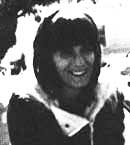
|
Karen Silkwood, a technician and union activist (Oil, Chemical, and Atomic Workers' Union) at the Kerr-McGee Cimarron plutonium fuels production plant near Crescent, Oklahoma, was killed in a one-car crash.
|
Read
more about her story:   |
|
 Maya
Ying Lin Maya
Ying Lin |
The
Vietnam Veterans Memorial was dedicated in Washington,
D.C. Carved into black granite are the 58,260 names
of those Americans who died in Vietnam. The designer,
Maya Ying Lin of Athens, Ohio, a 21-year-old architecture
student at Yale University, was the winner of the
competition that drew 1,421 design entries: ".
. . this memorial is for those who have died, and
for us to remember them." Eventually, the Memorial
included three elements, the Wall of names, the Three
Servicemen Statue and Flagpole, and the Vietnam Women's
Memorial. |
| The
Wall of Names, the Three Servicemen Statue and Flagpole,
and the Vietnam Women's Memorial |
Read
more about the memorial: |
Stunning
photo gallery of the Memorial including interactive panoramic
images  |
Charlie
Rose interview with Maya Lin and filmmaker Freida Lee Mock,
who made the Academy-Award-winning documentary, “Maya
Lin: A Strong Clear Vision”
 |
|
| Eugene Ely performed the first airplane
takeoff from a ship. His Curtiss pusher flew from the deck
of the U.S.S. Birmingham in Hampton Roads, Virginia. |
By January
he would execute the first (takeoff and) landing on a warship,
the U.S.S. Pennsylvania. Captain Washington I. Chambers of
the Navy Department had been interested in the military uses
for the seven-year-old invention.
Naval flight training started
shortly thereafter. |
 |
More of the
whole story.  |
|
"Ten Million Americans Mobilized for Justice" began
a campaign to collect 10 million signatures on a petition urging
the Senate
not to censure Senator Joseph McCarthy (R-Wisconsin). The motion
of censure against Senator McCarthy was for obstructing a Senate
committee and for acting inexcusably and reprehensibly toward
a U.S. soldier appearing before his own committee.
McCarthy had used his Senate Permanent Investigations Subcommittee
to publicly denounce thousands as subversive, especially within
the federal government, many without any justification. The
political views of most were painted as treasonable and conspiratorial,
rather than differing political views.
The petition effort fell about nine million signatures short. |
More on Joe McCarthy  |
|
| Florida
Secretary of State Katherine Harris, simultaneously co-chair of
George W. Bush’s Florida presidential campaign organization
and the public official responsible for the conduct of the
election itself, certified Governor Bush’s fragile 300-vote
lead over Vice President Al Gore in the 2000 presidential election. |
 Katherine
Harris Katherine
Harris |
| Florida Judge Terry Lewis gave Harris the authority to accept
or reject a follow-up manual recount from some counties where
the count was open to question. Harris rejected the manual
recounts.
|
|
About
20 women peacefully picketing for universal suffrage (right
to vote), who had been arrested in front of the White House
a few days earlier, were subjected to beatings and torture
at Occoquan workhouse in Virginia.
The
National Women’s Party and other organizations had been
picketing the White House and President Woodrow |
 |
| Wilson as he traveled
around the country ever since the inauguration of his second
term. |
 |
The
incident became known as the “night of terror.”
Wilson had led the country into the European war (later called World War I),
by characterizing the U.S. mission as “making the world safe for democracy.” The
women demonstrating outside in Lafayette Square called attention to the need
for complete democracy at home, where half of its citizens lacked complete voting
rights. |
| Mary Winsor |
| Many
women, including Lucy Burns and Alice Paul, had been
arrested several times, usually for obstructing the
sidewalk, and imprisoned before. When a judge learned
of the abuse he freed the women. Public outrage over
their treatment increased sympathy for the suffrage
movement. |
 |
 |
| left:
Lucy Burns in Occoquan Workhouse, Washington, DC right:
Alice Paul, New
Jersey, National Chairman, Congressional Union for Woman
Suffrage;
Member, Ex-Officio, National Executive Committee, Woman's
Party,ca 1915 |
Amazing
resources from the Library of Congress on women’s
suffrage  |
|
|
75,000
men were called to Armed Forces duty under the first
peacetime conscription. |
 |
| Draft inductees leaving Wilmington,
Delaware in November, 1941 |
|
Heinrich
Himmler, Adolf Hitler’s head of the SS (Schutzstaffel
or protective rank), Gestapo, the Waffen SS and the Death’s
Head units that ran the concentration camps, made public
an order that Gypsies (more properly the Roma) and those
of mixed Roma blood were to be put on "the same level
as Jews and placed in concentration camps."
|

|
Gypsy
prisoners arriving at a Concentration Camp
|
|

|
Himmler was determined to prosecute Nazi racial policies, which dictated the elimination from Germany and German-controlled territories of all races deemed "inferior," as well as "asocial" types, such as hardcore criminals. Gypsies fell into both categories according to the thinking of Nazi ideologues and had been executed in droves both in Poland and the Soviet Union. The order of November 15 was merely a more comprehensive program, as it included the deportation to the Auschwitz death camp of Gypsies already in labor camps.
|
The Gypsies in Germany  |
Gypsies: Forgotten Victims of the Holocaust  |
|
|
U.S. Committee for a Sane Nuclear Policy (SANE) was founded.
Thirty years later on November 20, SANE merged with
the Nuclear Freeze organization (dedicated to freezing
all nuclear weapons testing worldwide) at a joint
convention in Cleveland to form SANE/FREEZE. Its
successor is known as Peace Action, the largest U.S.
peace organization. |

Sane Nuclear Policy poster, 1960 |
SANE history  Peace Action Peace Action |
|
| Following
a symbolic three-day "March Against
Death," the second national "moratorium" against
the Vietnam War opened with massive and peaceful demonstrations
in San Francisco and Washington, D.C. Organized
by the New Mobilization Committee to End the War in Vietnam
("New Mobe"), an estimated 500,000 demonstrators
participated as part of the largest such gathering to date. |
 |
|
It began with a march down Pennsylvania Avenue in front
of the White House (while Pres. Nixon watched the Purdue-Ohio
State football game on TV) to the Washington Monument,
where a mass rally with speeches was held.
Pete Seeger,
Arlo Guthrie, Peter, Paul and Mary, and four different
touring casts of the musical "Hair" entertained
the demonstrators. The rally concluded with nearly 40 hours
of continuous reading of known U.S. deaths (to that date)
in the Vietnam War. |
|
| A
government tribunal in Nicaragua convicted American Eugene
Hasenfus, a CIA operative, of delivering arms
to Contra rebels
and sentenced him to 30 years in prison. He had been arrested
when his plane was shot down by Sandanista troops. He was
pardoned a month after his conviction (his last name means "rabbit's
foot" in German). |
 Hasenfus under arrest Hasenfus under arrest |
|
An
obscenity trial began for Radclyffe Hall's novel, "The
Well of Loneliness." Great Britain banned it for its
treatment of lesbianism, though it contained no explicit
sexual references. |
|

|
A U.S. court in 1929 ruled similarly,
for its sympathetic portrait of homosexuality, and because
it "pleads for tolerance on the part of society." |
 Radclyffe
Hall Radclyffe
Hall
|
Read
more  |
|
| Six Jesuit
priests, their housekeeper and her daughter were brutally
murdered by U.S.-trained and -supported death squads in El
Salvador. |
|
In
1995 the United Nations Commission on the Truth for El
Salvador linked the slayings to 19 members of the armed
forces who were graduates of the School of the Americas
(SOA, now known as Western Hemisphere Institute for Security
Cooperation), a facility run by the U.S. Army at Fort
Benning, Georgia.
Over its 59 years, the SOA has trained over 60,000
Latin American soldiers in counterinsurgency techniques, sniper,
commando and psychological warfare, military intelligence and
interrogation tactics. The graduates have consistently used
their skills to wage a war against their own people. |
 |
| Among
those targeted by SOA graduates are educators, union organizers,
religious workers, student leaders, and others who work for
the rights of the poor. |
The
Truth Commission’s report  |
Read
more  |
More
on the School of the Americas  |
|
| President
George H. W. Bush issued Executive Order 12735 which found
the spread of chemical and biological weapons (CBW) to
constitute
an "unusual and extraordinary threat to the national security
and foreign policy of the United States." He declared
a state of national emergency to deal with this threat. The
order reiterated U.S. policy to lead and seek multilaterally
coordinated efforts to control the spread of CW and BW and
directed the secretaries of State and Commerce to adopt a variety
of export controls. |
|
| After receiving assurances from the United States, Britain,
and France, the Ukrainian Parliament approved Ukraine's agreement
to follow the Nuclear Non-Proliferation Treaty as a non-nuclear-weapons
state. |
|

|
President
Nixon told an Associated Press managing editors meeting
at Disney World in Orlando, Florida, that "people
have got to know whether or not their president is
a crook. Well, I'm not a crook." |
Read
more  |
 |
|
 |
Hundreds were arrested at the Women's Pentagon Action protest of patriarchy
and its war-making. |
Read
more  |
|
| Riot police in Prague, the capital of Czechoslovakia,
arrested hundreds of people demanding the resignation of the
leader of the Communist-led government. More than 15,000 people,
mostly students, took part in the demonstration demanding democratic
rights. [see November 18, 1989 below] |
|
| The Florida Supreme Court froze the tallying of the state's
presidential election returns, forbidding Secretary of State
Katherine Harris to certify results of the vote count in the
presidential race between Republican George W. Bush and Democrat
Al Gore. |
|
Hundreds of suffragists marched on the House of Commons in London, England, with reinforcements arriving to replace the "fallen" and arrested. Protesting government inaction on the Conciliation Bill, which would have enfranchised about a million women, they were brutally forced back by London police, leading to a public outcry. |
Read
more |
|
 |
FBI
director J. Edgar Hoover publicly characterized Reverend
Martin Luther
King, Jr. as "the most notorious liar in the country." King
replied that Hoover "has apparently faltered under
the awesome burden, complexities, and responsibilities
of his office."
|
 |
The FBI vs. Martin Luther King  Democracy Now Democracy Now |
|
| President
Richard Nixon asked Congress for supplemental appropriations
for the Cambodian government of Premier Lon
Nol. Nixon requested $155 million in new funds for Cambodia — $85
million of which would be for military assistance, mainly in
the form of ammunition. |
|
 |
More
than 50,000 people took to the streets of Sofia, the
capital of Bulgaria,
demanding political reform. In the biggest demonstration
in the country's post-war history, protesters held up banners
and chanted:
"We want democracy now." |
Read
more |
|
 |
South
Africa's ruling National Party, and leaders of 20 other parties
representing both blacks and whites, approved a new national
constitution that provided fundamental rights to blacks and
other non-whites, ending the apartheid system. South Africa
held its first democratic multi-racial election on April
26, 1994.
|
| From
the preamble: “WHEREAS
there is a need to create a new order in which all South
Africans will be entitled to a common South African citizenship
in a sovereign and democratic constitutional state in which
there is equality between men and women and people of all
races so that all citizens shall be able to enjoy and exercise
their fundamental rights and freedoms....” |

|
South
African citizens in line to vote. |
 Constitutional history of South Africa Constitutional history of South Africa  |
|
In London, 100,000 marched
against the U.S. and British attacks against Afghanistan.
|
 |
|
| Joe Hill, a labor organizer for the Industrial Workers of the World (IWW) was assassinated by firing squad in the courtyard of the Utah State Penitentiary in Salt Lake City. |
 |
The IWW, or Wobblies as they were know were advocates of organizing all workers into One Big Union. It is reported that Joe had been framed for murder by copper bosses, the press and government forces.
Just prior to his execution, as Joe stood before the firing squad he propelled himself him from organizer to labor martyrdom with these words: "Don't waste any time in mourning. Organize!" |
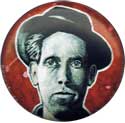 |
Joe Hill pin |
| 1" diameter - satin finish |
| Union printed - made in Detroit. |
 |
|
|
In an effort to undercut growing opposition
to a draft made necessary by the Vietnam War, Congress passed
a law requiring random selection of draftees through a lottery.
The Selective Service System would call up young men based
upon their birthday, first with 19-year-olds and those with
expired college deferments. |
|
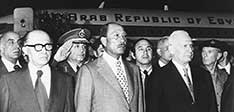 |
In
an unprecedented move for an Arab leader, Egyptian President
Anwar el-Sadat traveled to Israel to seek a permanent peace
settlaement with Egypt's neighbor after decades of conflict.
This action was extremely unpopular in the Arab World and
especially among Muslim fundamentalists. Egypt and Israel
had fought four wars since 1948.
|
| Sadat
arrives in Israel |
 |
Sadat on November
9:
“ Israel would be astonished when they hear me
say this. But I say it. I am ready to go even to their home
... to the Knesset
and discuss peace with them if need be.”
Israeli Prime Minister Menachem Begin on November 11:
“ Let us say to one another, and let it be a silent oath by the
peoples of Egypt and Israel: no more wars, no more bloodshed
and no more threats.”
Together in Israel:
Sadat:
“ I wish to tell you today and I proclaim to the
whole world: We accept to live with you in a lasting and just
peace.”
Begin:
“ Everything must be negotiated and can be negotiated.
We Jews appreciate courage, and we will know how to appreciate
our visitor's courage.” |
Sadat’s
speech to the Israeli Knesset (parliament): |
|
The
term "scab" was first used in print
by the Albany (N.Y.) Typographical Society.
A scab is
someone who crosses a union’s picket line and takes
the job of a striking worker.
|

|
| |
Read The Scab by Jack London
|
|
|
The International
War Crimes Tribunal began in Nuremberg, Germany, and continued
until October 1, 1946, establishing that military and political
subordinates are responsible for their own actions even
if ordered by their superiors.
|
Twenty-four
high-ranking Nazis were on trial for atrocities committed
during World War II, ranging from crimes against peace
to crimes of war, to crimes against humanity. The Nuremberg
Trials were conducted by judges from the United States,
the Soviet Union, France, and Great Britain. |
 The
Nuremberg defendants The
Nuremberg defendants
|
|
Read
more 
|
|
The
United Nations proclaimed "The Declaration of the Rights of the Child," because “the
child, by reason of his physical and mental immaturity, needs
special safeguards and care, including appropriate legal
protection, before as well as after birth.” |
Read
the text of the Declaration  |
|
President John F.
Kennedy issued an executive order forbidding racial discrimination
in public housing.
|
|
Eighty-nine American Indians seized Alcatraz Island in San Francisco
Bay, offering to buy the island from the federal government
for $24 worth of beads (the alleged price paid to the Canarsee
Delaware Indians for Manhattan Island; it was actually 60 Dutch
guilders).
Their
numbers swelled into the hundreds at times; the General Services
Administration, which had responsibility for the site of
the former federal prison, and Coast Guard gave them the
opportunity to leave the island peacefully. |
They were reclaiming it as Indian land by right of discovery,
and demanding fairness and respect for native peoples. The
occupation lasted for more than a year. Said Richard Oakes,
a Mohawk from New York, "We hold The Rock." |

|
Indian people and their supporters wait for the ferry.
Photo/Ilka
Hartmann |

a
new entrance to Alcatraz Photo/Michelle
Vignes
 Read more about the occupation Read more about the occupation 

|

|
LaNada
Boyer (formerly Means) inside one of the Alcatraz guard
barracks where occupiers lived from 1969-71. Much of
the graffiti from 30 years ago remains throughout the
island today.
Photo
by Linda Sue Scott.
|
|
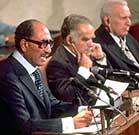 |
Egyptian
President Anwar El-Sadat addressed the Israeli Knesset (parliament).
"I come to you today on solid ground to shape a new
life and to establish peace. "But to be absolutely frank
with you, I took this decision after long thought, knowing
that it constitutes a great risk...." |
Text
of Sadat’s
speech to the Israeli Knesset  |
Listen
to the speech  |
|
| SANE
(The Committee for a Sane Nuclear Policy) and FREEZE (the
campaign to freeze all testing of nuclear weapons) merged
at their first combined convention in Cleveland, Ohio,
becoming the largest U.S. peace organization. |
Peace
Action today  |
|
| The
U.S. Senate approved the North American Free Trade Agreement
(NAFTA), creating the world’s
largest trade area covering Canada, the U.S. and Mexico. |
|
|
200,000
members of the United Auto Workers went on strike against
General Motors, the first
major strike following World War II. The UAW’s demand
for a 30% wage increase was based on the increase in the
cost of living during the war (28% according to the Department
of Labor), the wartime freeze on wages, and the cut in the
average workweek with the disappearance of overtime pay in
manufacturing.
|

|
 |
But
the UAW also considered profits and prices a subject for
negotiation, a position rejected by GM. The union did not
merely say that labor was entitled to enough wages to live
on. It also said that labor was entitled to share in the
wealth produced by industry.
“...
Unless we get a more realistic distribution of America’s
wealth, we won’t get enough to keep this machine
going.”
–Walter
Reuther, UAW President
|
More about the strike  |
|
| President
Richard Nixon's attorney, J. Fred Buzhardt, revealed the
existence of an 18 1/2-minute gap in one of the subpoenaed
White House tape recordings of Watergate conversations
made by President Richard Nixon in the days after the Watergate
break-in. |
|
The
erasure was blamed on an accident by Nixon's private
secretary, Rose Mary Woods, but scientific analysis determined
the erasures to be deliberate. White House Chief of Staff
Alexander Haig later attributed the gap to "sinister
forces."
|
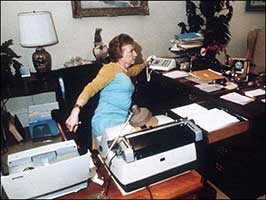 |
Rose
Mary Woods, demonstrating how she might
have
created the Watergate tape gap |
More about Rose Mary Woods  |
|
| Both
Houses of Congress voted to override President Gerald Ford’s
veto of updates to the Freedom of Information Act. Originally
passed in 1966, it required federal agencies to release
information upon request to citizens and journalists. |
The
amendments put an end to governmental resistance to compliance,
including
excessive fees, bureaucratic delays, and the need to sometimes
resort to expensive litigation to force the government to share
copies of documents.
Ford advisors Chief of Staff Donald Rumsfeld, his deputy Dick
Cheney, and government lawyer Antonin Scalia advised him to
veto it. |
 |
Chief of Staff Donald
Rumsfeld, President Gerald Ford
and Deputy Chief of Staff
Richard Cheney April 28, 1975 |
What
was the dispute?  |
|
| The
Senate Select Committee to Study Governmental Operations
with Respect to Intelligence Activities,
led by Senator Frank Church (D-Idaho), issued a report charging
U.S. government officials were behind assassination plots
against two foreign leaders – Fidel Castro (Cuba) and
Patrice Lumumba (Congo), and were heavily involved in at
least three other plots: Rafael Trujillo (Dominican Republic),
Ngo Dinh Diem (Vietnam), Rene Schneider (Chile). |
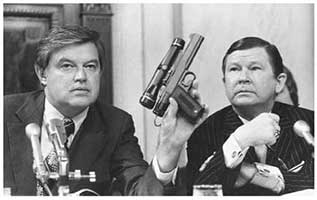
|
Senator Frank Church, left, chairman of the Senate Select Intelligence Committee,
displays a poison dart gun as co-chairman Senator John Tower (R-TX) watches. |
| The committee, a
precursor to the Senate Intelligence Committee, was established
to look into misuse of and abuse by intelligence agencies,
particularly the CIA and FBI, some of which had been revealed
by the Watergate investigations. |
| Fidel
Castro / Patrice Lumumba / Rafael Trujillo / Ngo Dinh
Diem / Rene Schneider |
Read
more  |
|
| More
than 350,000 demonstrated in Amsterdam against U.S. nuclear-armed
cruise missiles on European soil. |
|
| A
full-scale summit conference, the first of five between
the President Ronald Reagan of the U.S. and General Secretary
Mikhail Gorbachev of the Soviet Union concluded. There
was optimism over beginning a more productive and cooperative
relationship between the two countries, each of which had
thousands of nuclear warheads targeted at the other.The
U.S. had proposed building a space-based anti-ballistic missile
system, commonly known as “Star Wars,” which
the Soviets had strongly opposed as an escalation of the
nuclear arms race. |
| In an unofficial meeting the previous evening, President
Reagan had noted that he and Gorbachev were meeting for the
first
time at this level and had little practice. Nevertheless, having
read the history of previous summit meetings, he had concluded
that those earlier leaders had not accomplished very much.
Therefore, he suggested that he and Gorbachev say, "To
hell with the past, we'll do it our way and get something done.” Gorbachev
concurred. |
 |
| Reagan and Gorbachev
at their first summit |
|
|
National
Security Council member Oliver North and his secretary,
Fawn Hall, began shredding documents that would have
exposed their participation in a range of illegal activities
regarding the sale of arms to Iran in an attempt to free
hostages, and the diversion of the proceeds to an insurgent
Nicaraguan group known as the contras. |

Fawn
Hall
|

Oliver
North
|
More on Fawn Hill  |
|
| China
officially charged well-known human rights activist and
political dissident Wei Jingsheng with trying to “overthrow
the government.” Wei had not been seen for a year
and a half after disappearing into police custody after
meeting with a U.S. assistant secretary of state for human
rights and humanitarian affairs. |
|
"If
the people allow the power holders, in the peoples' name,
to violate and ignore the rights of some of the people
then, at the same time, they are giving the power holders
the power to violate the rights of all the people.”
“
Most people wait until others are standing to make their
move, very few are willing to stand up first or to stand
alone. That's why my friends call me a fool! But I don't
have any regrets." – Wei
Jingsheng
Wei
Jingsheng
|
 |
|
He
had been imprisoned previously for his involvement with
the Democracy Wall movement, including years in solitary
confinement. He had also spoken out on behalf of the
Tibetans.
|
|
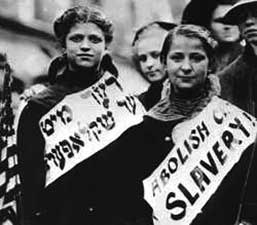 |
In
New York City, the International Ladies Garment Workers
Union went on strike against sweatshop conditions in
what became known as the "Uprising of the 20,000" and
the "Girl's Revolt."
The strikers won the support
of other workers and the women's suffrage movement for
their persistence and unity in the face of police brutality
and biased courts. A judge told arrested pickets: "You
are on strike against God." This was the first mass
strike by women in the U.S. |
ILGWU timeline 
|
|
President John F. Kennedy was shot dead
in Dallas during a motorcade.
Vice President Lyndon Johnson
was sworn in as president within hours. |
|
|

|
What is believed to
be the first interracial kiss on U.S. broadcast television
occurred in an episode of Star Trek between William Shatner
and Nichelle Nichols. |
More about this kiss  |
|
7,000
marched on the U.S. Army’s School of the Americas
(SOA) at Fort Benning, outside Columbus, Georgia. |
|
They
were protesting the school’s training of Latin
American soldiers and other security personnel who return
to their countries and are involved in violence and oppression
of their populations. 2,319 people were arrested for
trespassing.
Protests at the School of the Americas, organized by
SOA Watch, occur every November. The school is now known
by the U.S. Army as the Western Hemisphere Institute for
Security Cooperation. |

|
2002
protest at SOA
|
Visit School
of the Americas watch. |
|
|

|
The first recorded strike took place in Egypt when necropolis workers who had not been paid for their work in more than two months sat down and refused to work until they were paid and able to eat. |
More about this 1st strike  |
|
| Black Louisiana sugarcane workers, in cooperation with the racially integrated Knights of Labor, had gone on strike at the beginning of the month over their meager pay issued in script (not cash). The script was redeemable only at the company store where excessive prices were charged. When the first freeze of the season arrived and damaged the crop, the plantation owners were angered. The Louisiana Militia, aided by bands of "prominent citizens," shot and killed at least 35 unarmed black sugar workers striking to gain a dollar-per-day wage, and lynched two strike leaders in what became known as the Thibodaux Massacre. |
More on the Thibodaux Massacre.   |
|
|
President Ronald Reagan signed off on a top secret document, National Security Decision Directive 17 (NSDD-17), which gave the Central Intelligence Agency a budget of $19 million to recruit and support a 500-man force of Nicaraguan insurgents to conduct covert actions against the leftist Sandinista elected government. This marked the beginning of official U.S. support for the so-called contras in their war against the Nicaraguans.
|
 |
Read
(most of) the memo  |
More on the Reagan policy  |
|
| British naturalist Charles Darwin published On the Origin of Species, which explained his theory of evolution. |
The basis for the theory is natural selection, the process by which organisms change over time as a result of changes in heritable (genetically based) physical or behavioral traits. Such changes allow an organism to better adapt to its environment and help it survive and have more offspring.
Evolution is now universally accepted among scientists, and is the organizing principle upon which modern biological and related sciences are based.
|

|
Behind
the Controversy: How Evolution Works  |
Darwin
and "On the Origin of Species" |
|
Women and men from 21 states met in Cleveland to organize the American Women Suffrage Association, led by Lucy Stone, Henry Blackwell, Thomas Wentworth Higginson, and Julia Ward Howe. The group’s approach to enfranchisement for women was through acquiring the right to vote state-by-state.
Those in Cleveland had broken with Susan B. Anthony and Elizabeth Cady Stanton of the National Women Suffrage Association over the 15th amendment to the Constitution, which had granted the vote to black male Americans following the end of slavery, but had not enfranchised women, whether white or black. Anthony and Stanton protested the protection of black rights over universal suffrage. |
Original document from AWSA in the National Archives  |
|
A group of writers, producers and directors that became known as the "Hollywood 10" were cited for contempt of Congress when they refused to cooperate at hearings about alleged Communist influence in the movie industry. |

|
Following their appearance in front of the House Un-American Activities Committee (HUAC) under Representative John Parnell Thomas (R-New Jersey), the House of Representatives voted 346-17 for the citations. All were convicted and sentenced to 6-12 months in prison. The charges were upheld by the U.S. Supreme Court. |
| The
Hollywood 10 |
Invoking their 5th Amendment right not to be witnesses against themselves, and their 1st Amendment right to freely associate with whom they choose, the Hollywood 10 refused to answer the question, "Are you a member of the Communist Party or have you ever been a member of the Communist Party?"
Others cooperated: the mother of actor and dancer Ginger Rogers testified her daughter had been asked to say in a film, "Share and share alike, that's democracy," a line from a script written by the blacklisted Dalton Trumbo. Rogers said this was "definitely Communist propaganda." |
 Free
The Hollywood 10 demo Free
The Hollywood 10 demo |
 Read
more Read
more  |
|
14 American students met with Vietnamese in Hanoi to plan the "Peoples' Peace Treaty" between the peoples of the United States, South Vietnam and North Vietnam. |

|
It begins, "Be it known that the American people and the Vietnamese people are not enemies. The war is carried out in the names of the people of the United States and South Vietnam, but without our consent. It destroys the land and people of Vietnam. It drains America of its resources, its youth, and its honor."
The treaty was ultimately endorsed by millions. |
|
|
On
Thanksgiving Day seven Plowshares activists hammered
and poured blood on B-52 bombers converted to carry cruise
missiles at Griffiss Air Force Base near Syracuse, New
York.
|

Bloody
handprint on missile.
|
Watch Plowshares history video  |
 Read
more Read
more  |
|
The
United States and the Soviet Union agreed to scrap short-
and medium-range missiles in the first superpower treaty
to eliminate an entire class of nuclear weapons. The Intermediate
Nuclear Forces (INF treaty), signed by Reagan and Gorbachev,
was the first to actually reduce the number of nuclear weapons
held by the two sides.
|
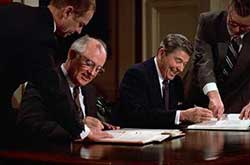
|
|
An Hawaiian Declaration of Independence  |
|
Indians marching with Mohandas Gandhi for recognition of their religious and cultural legitimacy, and individual freedom, were attacked by police, leaving five dead (shot from the back according to the inquest) and nine wounded. He was marching with more than 2000 striking miners from Natal to Transvaal provinces in South Africa in violation of the law.
Gandhi in his publication, Indian Opinion, had advocated the end of a
£3 tax on ex-indentured Indians. He had lamented the violence
that had been inflicted on his peaceful marchers. |
|
|

|
Film industry executives, meeting in New York, announced that the “Hollywood Ten” directors, producers, and writers who had refused to testify before the House Un-American Activities Committee (HUAC) would be fired or suspended, and not hired in the future, thus “blacklisted.”
|
Who
were the Hollywood Ten?  |
|
| President Ronald Reagan and Attorney General Edwin Meese revealed that $30 million in profits from secret arms sales to Iran had been diverted to support the Nicaraguan contra insurgents in violation of U.S. law. What became known as the Iran-Contra Affair was revealed three weeks after a Lebanese magazine reported arms had been sold in violation of U.S. policy. |
 Reagan & Meese Reagan & Meese |
The arms trade with the revolutionary government of the Islamic Republic of Iran was carried out in hopes of freeing some of the Western hostages held by Iran’s allies in the middle east. Reagan had repeatedly pledged never to negotiate with terrorists.
However, notes of an earlier meeting kept by then-Defense Secretary Caspar Weinberger said, "President decided to go with Israeli-Iranian offer to release our 5 hostages in return for sale of 4,000 TOWs [U.S. missiles] to Iran by Israel. [Sec. of State] George Shultz + I opposed -- [CIA Director] Bill Casey, Ed Meese + VP [George H.W. Bush] favored -- as did Poindexter."
The Congress had specifically barred U.S. funds going to the contras (Boland amendment) who were terrorizing the Nicaraguan countryside.
|

John Poindexter
|
Reagan and Meese denied knowledge of the activity and named two subordinates — National Security Advisor Admiral John M. Poindexter and National Security Council staffer Colonel Oliver L. North — as responsible and being dismissed from their jobs as a result. ". . . [I] was not fully informed on the nature of one of the activities," said President Reagan, referring to the fact that money from weapons sales to Iran was diverted to the contras. |

Who's
who in Iran-Contra |
Tom
Tomorrow on Iran-Contra  |
|
2,000 marched in New York city to protest the sale of animal fur for clothing. Over 50 other cities held similar demonstrations.
|
|
| U.N.
General Assembly passed a resolution against capital
punishment following an official
report which said, “Examination
of the number of murders before and after the abolition
of the death penalty does not support the theory that capital
punishment has a unique deterrent effect.” |
More on capital punishment
and homicide  |
|
| American
Indian activists marked Thanksgiving with a National Day
of Mourning for Native Americans by occupying Plymouth
Rock in Massachusetts, the alleged landing
spot of the Pilgrims’ arrival in Massachusetts colony.
Led by Wamsutta Frank James, an Aquinnah Wampanoag elder
and music teacher, over 200 Indians seized the Mayflower
II and painted Plymouth Rock red. |
 Day
of Mourning demo in downtown Plymouth Day
of Mourning demo in downtown Plymouth |
| James
had refused to speak at a state dinner the night before
commemorating the 350th anniversary of the landing, and
went on to organize United American Indians of New England |
 |
| Wamsutta
Frank James |
|
President
Ronald Reagan ordered military assistance to Iraq in the
war Saddam Hussein had begun by invading Iran. To prevent
an Iraqi military collapse, the Reagan administration supplied
battlefield intelligence on Iranian troop buildups to the
Iraqis, sometimes through third parties such as Saudi Arabia.
National Security Decision Directive 114, signed on that
day, stated that the United States would do "whatever was necessary
and legal" to prevent Iraq from losing the war with Iran.
It called for heightened regional military cooperation to defend
oil facilities, and measures to improve U.S. military capabilities
in the Persian Gulf.
The assistance was granted despite frequent and consistent
reports of Iraqi use of chemical weapons, a clear violation
of the 1925 Geneva Protocol. Mustard gas had been used against
Iranian troops and against “human wave” attacks
by thousands of Basij (Popular Mobilization Army or People's
Army) volunteers. |
The full story on U.S.-Iraq relations
at that time  |
The
Geneva Protocol  |
|
Pope
Urban II called on all Christians to liberate Jerusalem from
the Muslims
and reclaim the Holy Land: "Deus vult (God wills it)!" What
is currently called the Middle East was then in control of
the Turks who frequently barred Christian pilgrims entrance
to the city.
At the Council of Clermont in France, the pope promised absolution
and remission of sins for all who died in the service of Christ.
The mobilization of 60,000 to 100,000 Christians throughout
Europe in this effort became known as the First Crusade. |
The
First Crusade  |
|
The
No-Conscription Fellowship (NCF) was founded by two English
pacifists, Clifford Allen and Fenner Brockway. They opposed
the Military Service Act which introduced conscription, and
then mounted a vigorous campaign against the punishment and
imprisonment of conscientious objectors.
They were consistently
opposed to the war in Europe. |

Early
Fellowship members |
|
 Fellowship
members at a recent protest Fellowship
members at a recent protest |
Read more about Clifford Allen, Fenner Brockway and No-Conscription Fellowship  |
More on the
No-Conscription Fellowship from the Swarthmore College Peace
Collection  |
|
Jawaharlal
Nehru, India's first Prime Minister, made an impassioned
speech appealing to the United States and the Soviet Union
(Union of Soviet Socialist Republics) to end testing and
begin nuclear disarmament. The two superpowers were the
only nations with atomic weapons at the time.
Nehru had fought to free his country from British colonial authority through
acts of nonviolent passive resistance with Ghandi, and they achieved independence.
He stressed the urgency for the U.S. and U.S.S.R. to "save humanity from
the ultimate disaster.” |
| Nehru’s
Congress Party government nevertheless pursued an aggressive
nuclear program, starting in 1948, publicly committed
to peaceful purposes exclusively. Nehru acknowledged that the
possession of fissionable materials and growing expertise could
readily be directed toward production of such weapons. In the
absence of universal nuclear disarmament, he feared acquisition
of such weapons by potential adversaries. In particular for
India, this meant Pakistan or China.
|
 |
| India's first prime minister,
Jawaharlal Nehru |
Nuclear India - a short history  |
|
| In Washington D.C., 35,000 anti-war
protesters circled the White House then marched on to the Washington
Monument for
a rally against the war in Vietnam. |
|
| Reverend
Martin Luther King, Jr. announced the Southern Christian
Leadership Conference’s Poor People’s Campaign,
a movement to broadly address economic inequalities with
nonviolent direct action. "It must not be just black
people," argued King, "it must be all poor people.
We must include American Indians, Puerto Ricans, Mexicans,
and even poor whites." |
 |
Why a Poor People's Campaign?  |
|
| Over
one hundred members of the U.S. 71st Evacuation Hospital
and the 44th Medical Detachment at Pleiku, Vietnam, organized
a Thanksgiving protest fast called the “John Turkey
movement.” In Home before Morning, nurse Lynda Van
Devanter recalled her change in attitude. |
 |
“Earlier
in my tour, when I had heard about the war protesters,
I had felt angry at them for not supporting us. Now
I wished I could march with them . . . Most others in Pleiku
felt the same way . . . We even held our own Thanksgiving
Day fast—the John Turkey movement — as a show
of support for those who were trying to end the war through
protests and moratoriums. We heard that the fast had spread
to units all over Vietnam.” |
| Nurse
Lynda Van Devanter |
| The
fast received considerable media coverage when Denise Murray,
a nurse at Pleiku and daughter of a distinguished admiral,
made antiwar statements to the press. |
|
 Early
IBEW delegates Early
IBEW delegates |
The
National Brotherhood of Electrical Workers (now International, the IBEW) was founded
when 10 men met at Stolley’s Dance Hall in St. Louis,
Missouri. Their goal: the joining together of electricians
in a common organization to make a better life for all. |
 |
| The original logo adopted at the First Convention. |
Read more  |
|
 |
The
political party Sinn Fein (meaning “we ourselves” in
Gaelic) was founded in Dublin by Irish nationalist Arthur
Griffith. Its objective was to end British rule in Ireland
and seek national self-determination as a sovereign state. |
 |
Sinn Fein’s story of its origins  |
|
The U.S. Congress
passed the Comprehensive Threat Reduction Act (the Nunn-Lugar
legislation), which provided up to $400 million to assist with
the destruction of Soviet nuclear and chemical warheads.
The
legislation was initiated by Senator Sam Nunn (D-Georgia) and
Senator Richard Lugar (R-Indiana). |
|
A U.S. Army cavalry regiment under
Colonel J. M. Chivington (a Methodist missionary and candidate
for Congress), acting on orders from Colorado's Governor, John
Evans, and ignoring a white surrender flag flying just below
a U.S. flag, attacked sleeping Cheyenne and Arapaho Indians,
killing nearly 500, in what became known as the Sand Creek
Massacre. Captain Silas Soule, however, not only refused to
follow Chivington's lead at Sand Creek, but ordered his troops
not to participate in the attack.
The Indians, led by Black Kettle, had been ordered away from
Fort Lyon four days before, with the promise that they would
be safe. Virtually all of the victims, mostly women and children,
were tortured and scalped; many women, including the pregnant,
were mutilated. Nine of 900 cavalrymen were killed. A local
newspaper called this "a brilliant feat of arms," and
stated the soldiers had "covered themselves with glory."
At first, Chivington was widely praised for his "victory" at
the Battle of Sand Creek, and he and his troops were honored
with a parade in Denver. However, rumors of drunken soldiers
butchering unarmed women and children began to circulate, and
Congress ordered a formal investigation of the massacre. Chivington
was eventually threatened with court martial by the U.S. Army,
but as he had already left his military post, no criminal charges
were ever filed against him |
The Sand Creek Massacre Documentary Film Project  |
Eyewitness Congressional testimony of John S. Smith, a white Indian agent and interpreter:  |

|
 |
| Two
different paintings of the Sand Creek Massacre |
|
 |
U.S. President Lyndon B. Johnson establishes the Warren Commission to investigate the assassination of President John F. Kennedy. |
| Earl Warren and LBJ |
More about Earl Warren  |
More about The Warren Commission  |
|
U.S. Secretary of Defense Robert McNamara announces his resignation during the Vietnam War. |
 |
The Fog of War a movie about the Vietnam War  |
| Robert McNamara |
|
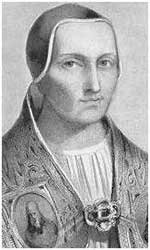 |
Pope
Innocent II, in a papal bull (or major sacred pronouncement
of canon law), ordered that
Jews, "whether men or women, must in all Christian countries
distinguish themselves from the rest of the population in public
places by a special kind of clothing." The rule was interpreted
as requiring a badge on clothing as determined by each country.
In England, for example, the tablets with the 10 commandments
were used. |
Read more  |
 |
|
| Senator
Eugene McCarthy (D-Minnesota) announced that he would run
on an anti-Vietnam war platform against President Lyndon Johnson
for the nomination of the Democratic Party. McCarthy, though
a contender to be Johnson's running mate in 1964, had since
become increasingly disenchanted with U.S. policy toward
Vietnam, and opposed the war in his campaign. |
 |
 McCarthy
on the campaign trail McCarthy
on the campaign trail |
“I
am not for peace at any price, but for an honorable, rational
and political solution to this war; a solution which I believe
will enhance our world position, encourage the respect of our
Allies and our potential adversaries, which will permit us
to get the necessary attention to other commitments . . . and
leave us with resources and moral energy to deal effectively
with [the] pressing domestic problems of the United States
itself.”
|
|
The
Brady Handgun Violence Prevention Act became law. It provided
for a waiting period before the purchase of a handgun, and
for the establishment of a national instant criminal background
check system to be used by firearms dealers before the transfer
of any handgun. |
| The law was named for James Brady, President Ronald Reagan’s
press secretary, who became a paraplegic after being shot in
the assassination attempt on Reagan. Following his recovery,
he and his wife, Sarah, became leading proponents of controlling
the proliferation of handguns. |
 |
| James Brady watches President
Clinton sign the bill |
|
 |
Tens of thousands of activists, students, union members and
environmentalists demonstrating for global justice shut
down the World Trade Organization (WTO) summit in Seattle,
Washington. |
| International
media coverage ignored both the blockade and the police riot
(and an enormous labor-sponsored rally and march), focusing
instead on minor property damage committed by a few dozen
self-described anarchists. |
 |
| photo
Elaine Brière |
What is the World Trade Organization? 
|
What the protests were about  |
|
November
1 2 3 4 5 6 7 8 9 10 11 12 13 14 15 16 17 18 19 20 21 22 23 24 25 26 27 28 29 30
Visit
another month
Jan
• Feb
• March • April
• May • June
• July
• Aug • Sept
• Oct • Nov
• Dec |
 Subscribe to our FREE! e-newsletter Subscribe to our FREE! e-newsletter

also announcements of new buttons and other cool stuff |
We make custom buttons
your design or ours
email your idea and info |
|
Because of your support peacebuttons has been able to donate to
several peace and justice organizations.
see list
Thank you! |
|
|
|










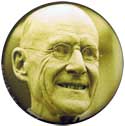







 Luddites smashing loom.
Luddites smashing loom.







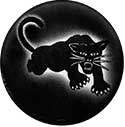
 Protests
at Alliant continue today.
Protests
at Alliant continue today.












 John
L. Lewis
John
L. Lewis
 Roger LaPorte
Roger LaPorte

 Florence,
Italy 11.9.2002
Florence,
Italy 11.9.2002















 Katherine
Harris
Katherine
Harris









 Hasenfus under arrest
Hasenfus under arrest
 Radclyffe
Hall
Radclyffe
Hall 


























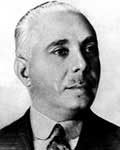













 Free
The Hollywood 10 demo
Free
The Hollywood 10 demo




 Reagan & Meese
Reagan & Meese

 Day
of Mourning demo in downtown Plymouth
Day
of Mourning demo in downtown Plymouth

 Fellowship
members at a recent protest
Fellowship
members at a recent protest


 Early
IBEW delegates
Early
IBEW delegates









 McCarthy
on the campaign trail
McCarthy
on the campaign trail 


